“If you don’t like the way the world is, you change it. You have an obligation to change it. You just do it one step at a time,” says Marian Edelman, an advocate for disadvantaged Americans.
Edelman’s remark seems to be fuelling the Peace Officers for Christ International (POFCI), a non-profit organisation registered in America to minister to disciplined forces and their families. But it has spread its wings to embrace economic empowerment projects in other countries.
In 2000 the organisation found its footing in Kenya to reach unemployed youth and women. POFCI started training farmers on different projects such as chicken, rabbit, fish and pig rearing.
“After training we went an extra mile to give the trainees free rabbits and feeds,” says Rev Samuel Mwangi, a missionary overseeing the projects in Thogoto, Kiambu county.
The organisation was an oasis for internally displaced persons (IDPs) after post-election violence. POFCI initiated rabbit rearing projects in the IDPs camps. This gave IDPs hope and a new beginning after loss of their livelihood.
“Rabbits have a short gestation period of 31 days and produce 42 kittens every year, high genetic selection potential, limited competition with humans for foods and produce high-quality meat,” says Mwangi, adding that their hide and fur are used to make clothes and other items.
“After embracing rabbit farming, everything changed. We started receiving calls from potential customers,” he says. He encourages residents to venture into rabbit farming. POFCI has extended its training to churches and self-help groups.
However, with the large number of farmers, free services became unsustainable and some quit from the farming. Early last year, France gave Kenya a contract to export 400,000 metric tonnes of rabbit meat every month but they were not able to meet the demand.
Germany, Belgium and Italy lead in rabbit meat importation globally. The organisation stepped in and launched Rabbit Millionaires project that encourages small-scale farmers to work in groups. “We realised that the farmers were selling their products individually.
We thought of bringing them together to meet the demand but the gap is still huge,” he says. Mwangi says they dubbed the project Rabbit Millionaires because a farmer who needs to be contracted should have at least 33 hybrid rabbits. The organisation is mentoring farmers to generate Sh1 million every year.
“If you want to be contracted you need to buy 33 mature rabbit, 30 does and three bucks from us at a cost of Sh5,000 for does and Sh5,500 for bucks. We buy a four-month-old rabbit at Sh1,000,” he says.
Apart from buying rabbits from farmers they also buy urine at Sh50 every litre. The farmers are supplying 1.5 tonnes of meat every month while the demand is 10 tonnes every month. “With three breeding farms and a variety of eight breeds we welcome potential farmers to start rabbit farming,” says Mwangi.
In the past, rabbit farming was not been taken seriously in many societies as rabbits were considered as pets. However, Mwangi says in recent years there has been awareness of the advantages of rabbit meat in developing countries to alleviate food shortage.
According to the Kenya Agricultural Research Institute (Kari), there are three breeds of rabbits in Kenya; California, Chinchilla and New Zealand white. Flemish Giant is also quite popular.
Chinchilla is a grey-brown breed and is preferred because it has a large mature weight. New Zealand and Californian are popular because they can be relied on for fur as well as meat. Chinchilla is preferred for meat because of its large mature size.









